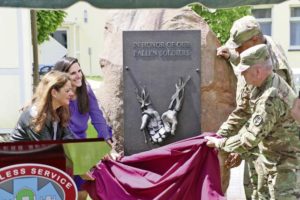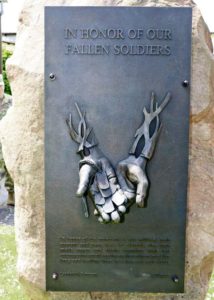Story and photos by Alofagia Oney
Regional Health Command Europe

Since 2003, 83 U.S. service members who died at Landstuhl Regional Medical Center made their last act of service to mankind one of charity, saving 236 lives through organ donation. On May 28, their actions were permanently immortalized during the unveiling of the Fallen Soldier Donor Memorial which stands tall in the LRMC Memorial Garden.
In partnership with the Deutsche Stiftung Organtransplantation, the organization responsible for coordinating organ donations in Germany, the LRMC intensive care unit staff have worked around the clock to ensure viable organs from patients who passed and identified as organ donors were properly maintained and ready for delivery to a waiting recipient.
“All of the 83 organ donors we’ve had at LRMC since 2003 were service members who either died in our hospital from combat wounds sustained in forward theaters, or perhaps from training exercises or other extenuating health issues,” said Army Lt. Col. Sean Reilly, chief of LRMC’s division of medicine and primary point of contact between the hospital and the DSO.
Presiding over the ceremony was the LRMC deputy commanding officer, Col. Claude Burnett, who highlighted this partnership.
“Today we honor the sacrifices of our fallen brothers and sisters in arms, who, even in death, continued to make a positive impact on our country and allied nations through organ donation,” said Burnett. “We also celebrate the tremendous partnership with the DSO, who through established processes, open communication and the utmost professionalism, was able to transplant over 230 donor organs to local national citizens in need since 2003.”
Dr. Ana Paula Barreiros, director of the central region of the DSO, was the guest speaker at the ceremony, and spent time honoring the memories of those service members who saved lives even after death.
“Organs from young, brave American Soldiers who died for their country [made it] to German patients waiting for lifesaving organs,” said Barreiros. “[These donors were] all very young, and it is important to imagine these young people thinking about life and death, and giving some unknown, ill patient a chance to live.”
The organ donations of fallen service members who died at LRMC, and who’s surviving families agreed to donate their organs, has made a positive impact on the lives of the local national transplant recipients, and speaks volumes of yet another partnership between the U.S. military and host nation allies.
“With the existing language barriers, the hospital staff and our coordinators [dealt with] different approaches, different cultures, and different legal circumstances,” said Barreiros. “But, due to your enormous dedication, your patience with us, and your optimistic help, this challenge turned into an excellent cross-border teamwork that led to a good end — saving lives.”
The idea of the Fallen Soldier Donor Memorial began with Mr. Gary Foxen, an Air Force veteran and a lung transplant recipient, who heard of U.S. service members dying at LRMC after sustaining injuries in combat; whether through their own volition or by the wishes of their surviving family members, those service members donated their organs to save lives of people in Germany and surrounding European countries. For Foxen, sharing the stories of their acts of selflessness was important and he worked with the organ procurement organization, OneLegacy, to create a long-lasting tribute to the fallen heroes.

In 2016, the first Fallen Soldier Donor Memorial was dedicated in the National Donor Memorial at the United Network for Organ Sharing in Richmond, Va. The bas-relief plaque on display at LRMC is the sister memorial showcasing a replica of the hands holding military identification tags, or “dog tags.”
The inscription on the plaque reads, “In honor of the members of our military, both present and past, here and abroad, who have made organ and tissue donation their last courageous act of service so that others may live long and healthy lives in a free and safe world.”


